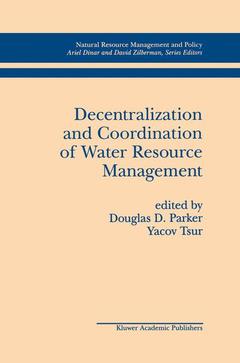Decentralization and Coordination of Water Resource Management, 1997 Natural Resource Management and Policy Series, Vol. 10
Langue : Anglais
Coordonnateurs : Parker Douglas D., Tsur Yacov

Centralized, top-down management of water resources through regulations has created unnecessary economic burdens upon users. More flexible decentralized controls through the use of economic incentives have gained acceptance over the past decade. The theme of this book is the increasing efforts throughout water-scarce regions to rely upon economic incentives and decentralized mechanisms for efficient water management and allocation.
The book begins with a section of introductory chapters describing water systems, institutions, constraints, and similarities in the following regions: Israel and the Middle East, Turkey, California, Florida, and Australia. Four of these regions face similar climates with wet winters and dry summers. Florida has a more even seasonal distribution of rainfall, yet it uses similar management strategies in controlling groundwater demand and water quality.
The book concludes with a section on water management case studies. These case studies examine issues of conflict related to both water quality and water quantity. While the case studies address both international and intranational concerns in specific regions of the world, they portray broad principles that are applicable to many regions.
The book begins with a section of introductory chapters describing water systems, institutions, constraints, and similarities in the following regions: Israel and the Middle East, Turkey, California, Florida, and Australia. Four of these regions face similar climates with wet winters and dry summers. Florida has a more even seasonal distribution of rainfall, yet it uses similar management strategies in controlling groundwater demand and water quality.
The book concludes with a section on water management case studies. These case studies examine issues of conflict related to both water quality and water quantity. While the case studies address both international and intranational concerns in specific regions of the world, they portray broad principles that are applicable to many regions.
1. Introduction and Overview.- Regional Water Constraints: Middle East, California, Florida, And Australia.- 2. The Israel Water Economy: An Overview.- 3. The Jordan River Basin: Beyond National Concerns.- 4. Water Resources in Turkey: Availability, Use, and Management.- 5. California’s Water Resources and Institutions.- 6. Decentralized Water Allocation in Florida.- 7. Australia’s Water Situation: Resource Allocation and Management in a Maturing System.- Economic Modeling Of Decentralized Water Management Policies.- 8. The Political Economy of Domestic Water Allocation: The Cases of Israel and Jordan.- 9. Transboundary Water Agreements and Development Assistance.- 10. Informational Imperfections in Water Resource Systems and the Political Economy of Water Supply and Pricing in Israel.- 11. The Strategic Interdependence of a Shared Water Aquifer: A General Equilibrium Analysis.- 12. Designing Institutions for Water Management.- 13. Employing Market Mechanisms to Encourage Efficient Use of Water in the Middle East.- 14. Efficient Management of Water in Agriculture.- 15. Deriving Short-Run, Multistage Demand Curves and Simulating Market Prices for Reservoir Water Under Weather Uncertainty.- 16. Water Institutions, Incentives, and Markets.- 17. On Event Uncertainty and Renewable Resource Management.- 18. Quantifying Tradeoffs Between In-Stream and Off-Stream Uses Under Weather Uncertainty.- 19. An Ex Ante Approach to Modeling Investment in New Technology.- 20. The Economics of Conjunctive Ground and Surface Water Irrigation Systems: Basic Principles and Empirical Evidence from Southern California.- Case Studies.- 21. Peace and Prospects for International Water Projects in the Jordan-Yarmouk River Basin.- 22. Modeling the Impacts of Reducing Agricultural Water Supplies:Lessons from California’s Bay/Delta Problem.- 23. Water and Conflict in the Twenty-first Century: The Middle East and California.- 24. Decentralized Mechanisms and Institutions for Managing Water Resources: Reflections on Experiences from Australia.
The theme of this book is the increasing efforts throughout water-scarce regions to rely upon economic incentives and decentralized mechanisms for efficient water management and allocation. The book begins with a section of introductory chapters describing water systems, institutions, constraints, and similarities in the following regions : Israel and the Middle East, Turkey, California, Florida, and Australia. The book concludes with a section on water management case studies. These case studies examine issues of conflict related ot both water quality and water quantity.
Date de parution : 10-2012
Ouvrage de 451 p.
15.5x23.5 cm
Thèmes de Decentralization and Coordination of Water Resource... :
Mots-clés :
Water Resources; Water resource management; controlling; development; groundwater; hydrogeology
© 2024 LAVOISIER S.A.S.



